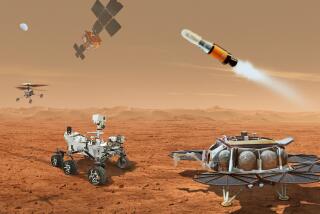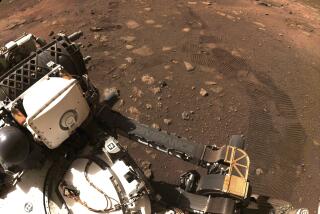A political ‘Curiosity,’ selling space at a time of lost jobs
The landing of the Curiosity spacecraft on Mars created a moment of singular American triumph, the kind politicians seemingly love to own. But in a nation suffering high unemployment and economic trepidation, no one expected Sunday’s emotionally charged landing on the Red Planet to recharge the muted national conversation about space exploration.
Mitt Romney, who is yet to outline a detailed program for space, did not comment about Curiosity. President Obama — whose program calls for doing more with less, including funding cuts for planetary missions — trumpeted the historic moment in a prepared statement.
“I suspect we will get through this entire campaign and three presidential debates without any serious conversation about NASA,” said one veteran space watcher, who asked not to be named because his federal agency had not authorized him to speak on the matter.
A longtime space journalist also did not expect much space talk in the presidential race, despite the effusive mood at the mission headquarters at Jet Propulsion Laboratory.
“I think personally, if you are turning your back on five decades of space activity and a leadership role that began with the space race, that is unfortunate,” said Leonard David, a veteran writer for Space.com and many publications. “This is the kind of endeavor that stirs up high-tech jobs and keeps Americans on the forefront of automation and robotics. Any president would be a little suspect to turn their back entirely on that legacy of leadership.”
In a visit to Cape Canaveral, Fla., in January, Romney talked about some of the general goals he would pursue in space, but declined to get into specifics, such as how much funding he would designate for NASA. Romney set four objectives: studying conditions in the universe that would dramatically affect Earth, supporting commercial endeavors, improving the health and well-being of Americans via research and promoting national defense.
But appearing too spacey about space can be a danger. Romney joined conservatives who belittled rival Newt Gingrich’s plan for developing a permanent colony on the moon. The conservative National Review put a cartoonish spaceman Gingrich on its cover. Presumed Republican nominee Romney criticized other candidates who have visited Florida’s “Space Coast,” seeking votes with promises of billions of dollars of new spending.
Obama’s statement praised Curiosity as “an unprecedented feat of technology that will stand as a point of national pride far into the future.” He added: “ It proves that even the longest of odds are no match for our unique blend of ingenuity and determination.”
The success of the mission so far might bolster the administration’s case for doing more with less. That’s essentially what’s called for in a budget worked out jointly between the administration and NASA for the 2013 fiscal year, which includes a $300-million cut to planetary science, the JPL specialty in the limelight this week. That’s potentially a 20% reduction that could cause hundreds of job losses at JPL.
Veteran space journalist David called Sunday’s landing “very much a flag-waving moment for the country, which succeeded in doing something very, very difficult.” Rep. Adam Schiff (D-Burbank) hoped Curiosity’s landing would “reinvigorate” efforts to restore funding for exploration of the plants, including future Mars missions.
But even a space-ophile like David said he expected other issues to quickly knock space out of the political conversation.
“Within the agency [NASA] there is a lot of thrashing about to determine what exactly the mission should be,” David said. “At a time of home foreclosures and with jobs scarce you get this whiplash from the public. They say, ‘We’re talking about going to Mars but, hey, I just lost my job.’”
Follow Politics Now on TwitterJames.rainey@latimes.com
Twitter: latimesrainey
More to Read
Get the L.A. Times Politics newsletter
Deeply reported insights into legislation, politics and policy from Sacramento, Washington and beyond. In your inbox three times per week.
You may occasionally receive promotional content from the Los Angeles Times.







